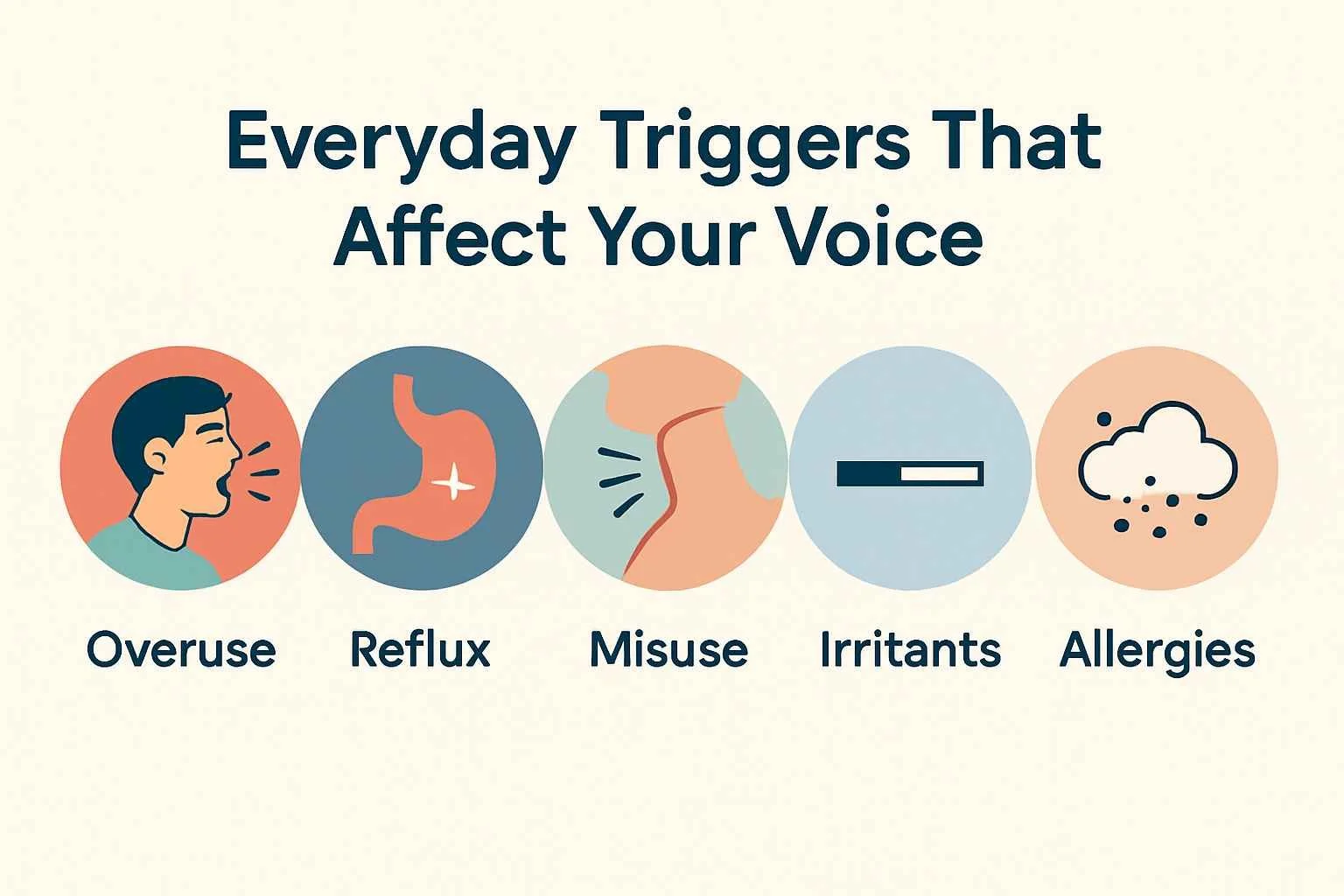Why Do I Keep Losing My Voice Even When I'm Not Sick?
Losing your voice when you are not feeling sick can be frustrating. Your voice might sound hoarse and fade during the day.
This type of voice loss often points to issues with the vocal cords, rather than an illness. Voice therapy can help you get your voice back and prevent it from happening again.
In this article, we’ll look at common causes and what you can do to treat and manage voice problems.
Key Takeaways:
Causes: Voice loss without illness can come from strain, allergies, or muscle tension.
Types of Hoarseness: Chronic hoarseness often signals an ongoing issue that won’t improve on its own. Acute laryngitis is short-term and illness-related.
Warning Signs: Hoarseness over two to three weeks, or severe symptoms such as significant pain, or trouble breathing, means that it's time to see a doctor for guidance.
Voice Treatment: After an evaluation by a laryngologist is conducted, the doctor may refer you to a speech-language pathologist for voice therapy.
What’s Happening When You Lose Your Voice?
Common Causes of a Hoarse Voice
Persistent Hoarseness: When to See a Doctor About Voice Changes
Tips to Support Your Voice at Home
What’s Happening When You Lose Your Voice?
Your voice depends on several parts of your body working together. It starts with your lungs pushing air through your windpipe into the larynx, where the vocal folds are located. These folds are smooth, pearly white bands that vibrate as air moves between them to create sound.
The vocal folds produce sound, which is then shaped by your throat, tongue, lips, and soft palate to form speech. When your voice disappears or sounds different, it usually means something has disrupted this system. The most common issue is with the vocal folds themselves. Swelling, inflammation, or tension can prevent them from closing and vibrating properly.
This can make your voice sound hoarse, weak, or breathy. In some cases, the sound may stop entirely.
Common Causes of a Hoarse Voice
Your voice is meant to handle a wide range of sounds and emotions, but certain patterns can wear it down over time. These five stressors are among the most common causes of vocal fatigue or voice loss. They often overlap and may point to deeper vocal problems that need medical attention.
Overuse
Talking for long periods without rest, especially in loud or busy environments, can wear out the vocal folds. Teachers, customer service workers, singers, and parents often push through fatigue without realizing the strain it puts on their voice.
Misuse
Yelling, throat clearing, or speaking with force can create irritation in the vocal folds. These habits lead to swelling and stiffness, and may contribute to chronic throat pain or difficulty speaking.
Acid Reflux
Stomach acid that rises into the throat, even silently, can inflame the vocal folds. Gastroesophageal reflux disease (GERD) often results in hoarseness, frequent throat clearing, or a sore throat that lingers after meals or in the morning.
Allergies
Postnasal drip, congestion, and inflammation caused by environmental or seasonal allergies can affect vocal quality. Constant throat clearing or coughing can make the vocal folds work harder and may lead to persistent hoarseness.
Irritants
Smoke, pollution, and strong chemicals inflame the tissues that support your voice. Ongoing exposure can cause chronic hoarseness and increase the risk of vocal cord paralysis in more serious cases.
Upper respiratory infections are also a common trigger. Viruses that affect the nose, throat, or chest can cause the vocal folds to swell. Hoarseness often lingers after the infection clears because the tissue takes longer to heal. Continuing to speak or sing during this time increases the risk of long-term damage or chronic vocal problems.
Other Factors That Affect Your Voice
Many parts of daily life can interfere with how your voice feels and sounds. Some of these stressors build up slowly, making them harder to connect to a single cause.
Dehydration
When your body lacks water, your vocal folds dry out. Dry tissue doesn’t vibrate well, which can leave your voice feeling tight, rough, or weak.
Medications
Some common medications can cause dryness or affect the nerves and muscles that control the voice. Antihistamines, antidepressants, and blood pressure drugs are frequent culprits.
Hormonal Changes
Fluctuations tied to the menstrual cycle, menopause, or thyroid function can shift vocal tone, stamina, and range. Singers and frequent voice users often notice these changes first.
Muscle Tension
Tightness in the neck, shoulders, or jaw can interfere with how the voice works. This kind of tension often causes effortful speech or unexplained fatigue during regular conversation.
Poor Technique
Pushing for volume or speaking without breath support makes the vocal folds work harder than they need to. This type of strain can build gradually and lead to ongoing hoarseness or throat pain.
Infections
Colds, flu, and other viral illnesses often cause temporary voice changes. Inflammation, coughing, and mucus can all disrupt normal vocal fold movement.
Psychological Stress
Chronic stress and anxiety can lead to shallow breathing and muscle tightness. These physical reactions can affect your voice in subtle but lasting ways.
Some hoarse voices are linked to more complex medical issues. Underlying voice disorders, neurological diseases, and thyroid problems can all affect vocal fold movement. These conditions may also bring symptoms like difficulty breathing, stiffness, weakness, or changes in voice quality that don’t go away.
If any of these factors continue without improvement, or if you notice signs like ongoing hoarseness, difficulty speaking, or throat pain, it may be time to talk with a speech-language pathologist. They can assess how your voice is working and help you understand the next steps for care.
Persistent Hoarseness: When to See a Doctor About Voice Changes
Most short-term voice changes improve with rest, but if symptoms last more than two weeks, it is important to have your vocal cords checked. Persistent hoarseness, breathiness, or changes in vocal range can signal an underlying cause that needs treatment.
Medical history can play a role, especially if you have thyroid problems, asthma, acid reflux, or ongoing allergies. Growths on the vocal folds, whether cancerous or noncancerous, may also affect voice quality and require imaging or further examination.
Voice changes that continue for an extended period without a clear explanation may be linked to vocal cord paralysis, stiffness, or weakness related to neurological diseases or structural issues. Pain during speech or swallowing, frequent voice loss, or noticeable fatigue when using your voice can all point to more serious vocal problems.
Difficulty breathing or a sense of tightness in the throat while speaking may also suggest the need for medical support. A laryngologist can help identify the source of the problem, recommend treatment for conditions like reflux or asthma, and refer you to a speech-language pathologist for voice therapy if needed.
Voice Therapy For Hoarseness
Check out our blog on voice therapy for hoarseness for more information!
How Voice Therapy Can Help
Voice therapy is often recommended when voice problems persist or begin to affect daily life. This may include chronic hoarseness, frequent voice loss, vocal fatigue, or changes in pitch, volume, or vocal quality. A laryngologist typically makes the referral after evaluating the vocal cords and ruling out other medical concerns.
Voice therapy focuses on vocal technique and on supporting it more effectively. Sessions are led by a speech-language pathologist who teaches techniques that reduce strain and improve vocal cord function.
You might work on breath support, posture, and gentle vocal exercises. For example, you may practice projecting without pushing or using less muscle tension while speaking. The goal is to help your voice sound stronger, improve vocal cord function, and last longer without discomfort or fatigue.
With regular practice and guidance, many people notice clear improvements. Therapy provides long-term strategies to protect your voice and reduce the chance of future problems.
Tips to Support Your Voice at Home
Small daily habits can help protect your vocal cords and reduce the chance of strain. Start by drinking plenty of water to keep the tissue around your vocal cords well hydrated. If the air in your home is dry, especially during winter, using a humidifier can ease irritation and dryness.
Avoid smoking and limit alcohol, both of which can dry out and inflame the voice box. If you have acid reflux, try to reduce acidic or spicy foods and avoid eating close to bedtime to prevent irritation from stomach acid.
During long days of talking, give your voice regular breaks. Even a few minutes of silence can lower tension and help your vocal cords recover. Try to avoid exposure to chemical fumes, cleaning sprays, or other irritants that can inflame your throat and vocal cords.
Frequently Asked Questions About Voice Loss or Hoarseness
1. Can you lose your voice due to stress?
Stress can lead to voice loss. High stress levels can cause muscle tension in the neck and throat, which affects how the vocal cords come together.
2. What is the science behind losing your voice?
Your voice comes from the vibration of the vocal cords. If the vocal cords swell, dry out, or can’t move properly, they don’t vibrate the way they should. When the vibration is off, your voice may sound hoarse or breathy.
3. What is the fastest way to cure laryngitis?
Rest your voice, drink plenty of water, and avoid irritants like smoke or alcohol. Most cases of laryngitis improve within a few days with vocal rest and hydration. If your voice remains hoarse for two to three weeks, see a laryngologist for an evaluation.
How Connected Speech Pathology Can Help
Connected Speech Pathology offers expert voice therapy online for individuals who experience voice loss without illness. Our experienced team helps you speak with less strain and more control through personalized sessions.
We’ve offered remote therapy for years with strong results across all types of clients. Each session gives you simple, effective tools to protect your voice and use it more comfortably every day.
Summary
Voice loss without being sick can be frustrating, but it's often treatable. The key is to identify the cause of the problem and obtain the necessary support. If your voice keeps fading or sounds hoarse often, voice therapy can help you speak more clearly and with less effort.
About the Author
Allison Geller is a communication coach, speech-language pathologist, and founder of Connected Speech Pathology, an international online practice providing professional communication coaching and speech therapy for children, teens, and adults. With more than two decades of experience, she has worked in medical and educational settings, published research on aphasia, and leads a team of specialists helping clients improve skills in public speaking, vocal presence, accent clarity, articulation, language, fluency, and interpersonal communication.










